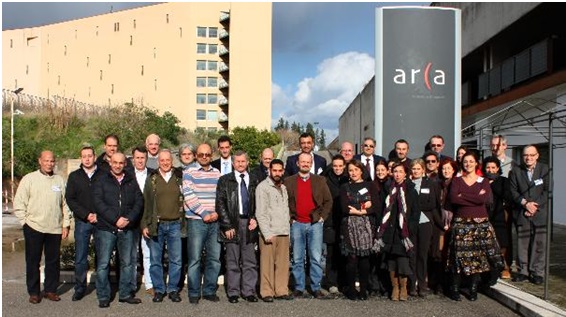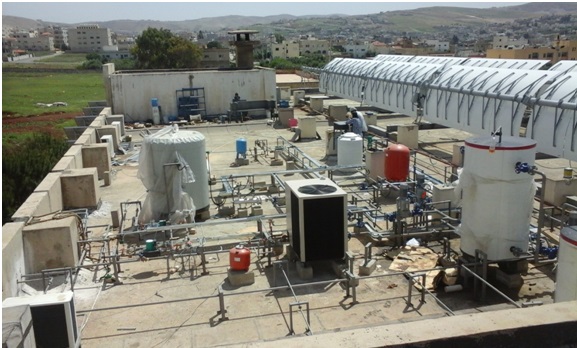Small Scale Solar Units for Mediterranean Communities/ STS- Med
Project manager: Prof. Dr. Rebhi Damseh
STS-Med focuses on the development, implementation and diffusion of pioneering technologies to improve energy efficiency in public buildings. The project will deploy 4 demonstrative plants based on Concentrating Solar (CS) power serving the energy demand of 20.000 end users coming from 20 Mediterranean local communities for a total power of 400 kW. More than 1.000 energy professionals will get in touch with the advanced CS systems through technical training sessions in addition to 200 public buildings owners/managers invited to visit the demonstrative plants.
Implementation will be supported by economic and policy studies, including recommendations on regulatory issues, fiscal incentives and public innovative procurement. The project also intends to create new business opportunities, notably by supporting the involvement of SMEs in local solar energy supply chains generated by the construction of the 4 pilot plants.
STS-Med is carried out by 14 organizations from Cyprus, Egypt, France, Greece, Italy and Jordan bringing together a wide range of technical, institutional and business expertise.
As the project requires a high level of technicality the coordinator (Arca - innovation and technology transfer) has gathered one of the best Mediterranean experts in CS Technologies and innovation support. The consortium includes:
- Arca Consortium - applicant organization (Italy) [THE LEAD PARTNER]
- ENEA - Italian National Agency for New technologies, Energy and Sustainable Economic Development (Italy)
- Sicilian Region - Dept. of Production Activities (Italy)
- Cyprus Chamber of Commerce and Industry (Cyprus)
- The Cyprus Institute - Energy, Environment and Water Research Center (Cyprus)
- Ministry of Energy and Mineral Resources (Jordan)
- Al Balqa - Applied University (Jordan)
- Millenium - Energy Industries (Jordan)
- Academy for Scientific Research and Technology (Egypt
- New and Renewable Energy Authority (Egypt)
- Elsewedy Power –Elsewedy Electric S.A.E (Egypt)
- University of Athens - Institute of Accelerating Systems and Applications (Greece)
- CEEI Provence - Innovation business support (France)
- CEA - French Alternative Energies & Atomic Energy Center (France)
The project started on 1/11/2012 and ended by 31/10/2016, however the project is still running and will be incubated till the year 2023.

The launch of the project activities took place on January 2013 the17th and the 18th in Palermo
The 2007-2013 ENPI CBC Mediterranean Sea Basin Program provides the framework for the implementation of cross border and cooperation activities in the context of the European Neighborhood Policy (implemented by European Commission’s Directorates-General RELEX and AIDCO), involving EU Mediterranean Countries and Mediterranean Partner Countries.
Projects funded under the strategic call Launched in May 2011, the strategic call focused on six topics chosen by the Joint Monitoring Committee based on their potential for the development of cooperation in the Mediterranean area. One of these topics was solar energy.
The general objective is promotion and implementation of innovative technologies and know-how transfer in the field of solar energy including that stemming from the private sector and especially from SMEs, and that may be implemented in particular in public facilities through public procurement processes.
To facilitate the adoption of CS small scale integrated systems in the Mediterranean basin, with a focus on the deployment of a flexible toolbox of CS applications by demonstrating their effectiveness in public building and premises- to deploy technologies from RTD results through case studies analysis and impact assessment and through the creation of demonstration unitsto create new opportunities for the commercial and industrial sectors, notably by improving technical skills of professionals involved and enabling SMEs to set up a full supply chain in the solar energy sector.
Major external stakeholders and project beneficiaries of STS Med are:
- Local and regional authorities competent with respect to energy policies will contribute to policy studies and be engaged through awareness activities conveying the main recommendations emerging from the project
- SMEs will be sensitized on the innovative technological solutions promoted by the project, and on the related market opportunities. They will be provided with detailed information concerning the outcome of the case studies, with training opportunities and tailored support aimed at fostering their inclusion in the supply chain that will be developed for the proposed CS pilot units
- Public building owners/managers and energy specialists will be engaged through specific dissemination and training actions, based on the case studies and the concentrating solar toolbox implemented in demonstrative systems, showing the added value of the proposed units through real cases.

By the end of the project implementation we expect the following results:
- increased awareness of target groups and institutional actors, through a tailored project communication strategy, transnational comparison of experiences and standard procedures
- support to policy makers in the decision-making process concerning incentives for solar energy
- enhancement of existing networks and clusters to promote know-how and results transfer at Mediterranean Sea Basin level
- optimization studies, case studies in different local contexts and requisite analysis
- integration & adaptation of innovative small scale multi-generative CS units & applications in public buildings
- achievement of an industrial perspective for advanced multi-generative solar units
- development of technological and operational industrial expertise
- fostered growth of local districts and production chains with the creation of new qualified jobs on CS system production & installation
During the project implementation team encounters in Al-Balqa Applied University, Millennium Company and Ministry of energy face many difficulties and obstacles. They can be summarized as follows:
- The difficulty in obtaining components that belong to the solar unit which obliged us to look at the international market requiring more time to supply these parts?
- Administrative procedures at the University have multiple loops and take long time to perform the tasks required, so always we behind the time.
The future vision of the project in different are as the following:
At the social level, the project final beneficiaries will be the users of public buildings for which the use of high efficiency solar systems will be promoted and enabled by the project activities; such buildings may include schools, hospitals, municipal facilities (eg city halls, sports centers, technical facilities, etc.).
At the sectoral level, public utilities, for their role of energy providers, will be involved to define programmers for introducing CSP within the energy infrastructures they manage. SMEs cluster/district organizations will have the chance to develop value chains related to a wider adoption of the solar energy mix.
At the market level, investors will be encouraged to assess the opportunities related to financing investment on CSP to a greater extent.
The possibilities for extension the duration of the project- please give duration, if any Actual duration of the project is three years and was extended the maximum duration of one year.
The possibility to support new projects as an extension of the current one - please give a title, if any, with an overview of the new project.
There are numerous projects proposals can apply for support from the European Union (ENI), from German (DAAD) and also from internal organization that funds any scientific research and development. Already we have developed some project proposals and we also will apply to other projects in the near future.
|